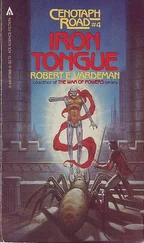“Lanky, we don’t know, and we can’t afford to care. Come on — let’s stay with the subject at hand, such as it is.”
Lanky shrugged, and moved on to the tooth-picking project, noting Dolbe’s shudder with satisfaction. That’d hold him.
“Brooks?” said Dolbe. “Brooks, you’re our idea man. Come up with an idea.”
“You know what I would do,” said Showard.
“Put a couple dozen linguists over a slow fire till they agreed to help us?”
“At least.”
“We can’t do that.”
“Then don’t bother me, Arnold!” Showard rasped. “Our problem is pretty simple here — we don’t know what we’re doing wrong, the only people who do know what we’re doing wrong are the effing linguists, and they won’t tell us! I don’t see anything subtle or complex to be dealt with here… they have to be forced to help, since they won’t do it of their own accord. All you nicey-nicies can sit there and blather till you decompose, but it won’t change things. We’re wasting our time.”
“It’s humiliating,” said St. Clair.
“What? Failing 100 percent of the time?”
“That, sure. But what I meant was, it’s humiliating that with the entire scientific resources of the civilized universe behind us we can’t figure out what it is the linguists know. It’s degrading.”
“You’re right, Beau. It is. But it’s the way things are, and the way they’ve been ever since anybody can remember. Moping over it won’t help — but forcing them to tell would. If we weren’t so dainty and all abristle with scrupulosities.”
“Have we got any kind of leverage at all with the linguists?”
“No. They’ve got all the leverage there is.”
“Couldn’t we go public about Honcho Chornyak playing games with us while he pretends he won’t dirty his lily-whites that way?”
“Why?” Showard demanded. “What’s he done, Beau? Comes to meetings when we ask him to. Never lets anything slip — follows his party line all the way, every time.”
“But he wants that secret, Brooks. He does want that kept secret. We could spread it all over the newslines.”
“Sure,” said Dolbe. “And then he could explain to the public precisely what it is that happens to the babies they volunteer for Government Work. He’d be real good at doing that. For followup, he could tell them how we go kidnap babies out of hospitals when the parents won’t volunteer.”
“Christ… would he do that?”
“Ah hell, Beau! Sure he’d do it,” Showard answered. “And when he got through we’d look like murderers — which we are, I might add — and he’d have it all put together somehow so there’d be no penalty for him either from the public or from the Lines. That’s one smart man, that Thomas Blair Chornyak, and when you add in that he’s a linguist you’ve got smart man cubed. He doesn’t play littlegirl games.”
“Well, like Arnold says, we’ve got to do something.”
“Yeah. We could all go loobyloo, Beau.”
“Listen,” said St. Clair, “how much do we know, really, about why the babies can’t hack the Interfacing? I mean, there’s no question that they can’t — I’ve seen that enough to believe it and plenty left over — but is there something we know about the problem that we could maybe use somehow?”
“Let’s review that, men,” said Dolbe expansively, lead ing now that somebody’d pointed the direction for him. Lead over thataway, Dolbe… wagons, ho, Dolbe… “Let’s go over that one more time.”
“There’s nothing there,” said Lanky Pugh. “I’ve run that all through the computer I don’t know how many times — there’s nothing there.”
“Sometimes the human brain has an edge on the computer, begging your pardon for the blasphemy, Lanky,” said Dolbe. “Let’s just give it one more runby.”
“All right,” Showard said. “All right. First principle: there’s no such thing as reality. We make it up by perceiving stimuli from the environment — external or internal — and making statements about it. Everybody perceives stuff, everybody makes up statements about it, everybody — so far as we can tell — agrees enough to get by, so that when I say ‘Hand me the coffee’ you know what to hand me. And that’s reality. Second principle: people get used to a certain kind of reality and come to expect it, and if what they perceive doesn’t fit the set of statements everybody’s agreed to, either the culture has to go through a kind of fit until it adjusts… or they just blank it out.”
“Fairies…” murmured Beau St. Clair. “Angels.”
“Yeah. They’re not in the set of reality statements for this culture, so if they’re ‘real’ we just don’t see them, don’t hear them, don’t smell them, don’t feel them… don’t taste them. If you can handle the idea of not-tasting an angel.” He leaned back and clasped his hands behind his head, letting the pocket knife dangle. “Now, third principle: human beings are handwired to expect certain kinds of perceptions — that’s where the trouble starts. The cognitive scientists tell us that whatever the hardwiring is in Terrans, it’s reasonably close to whatever it is in humanoid Aliens, because the brains and sensory systems are similar enough, even if there’s tentacles coming out of one humanoid’s ears and not out of some other’s. And the linguists tell us that because that hardwiring is close enough, you can take a brain-plus-sensory system that’s not set in concrete yet — say, a baby’s — and it can manage to make statements about what it perceives, even if it’s not in the consensus set. Babies don’t know what they’re going to have coming at them, they have to learn. And if it isn’t too different from what they’re hardwired to notice, they can handle it. They can include it in their reality.”
“So far, nothing,” said Lanky. “Like I said.”
“Fourth principle,” Showard went on, “even a baby, even still new to perceptions like it is, can’t handle it when it runs into a perception so completely different from the humanoid that it can’t be processed at all, much less put into a statement.”
“Babies can’t make statements,” said Lanky, disgustedly. “Shit. All they can do is — ”
“Lanky,” said Beau St. Clair, “that’s all wrong. They can’t attach the words you’d attach, they can’t pronounce the statements — but they make them. Like, ‘what I see there is something I have seen before, so I’ll look at the other thing I haven’t seen before.’ Like ‘that noise is my mother.’ Stuff like that.”
“Shit,” said Lanky again. “Fairies and angels. Fairy shit and angel shit.”
They were used to Lanky Pugh; they went ahead with it in spite of him.
“So,” Showard wound it up, “that’s what we know. There’s something about the way the non-humanoid Aliens perceive things, something about the ‘reality’ they make out of stimuli, so impossible that it freaks out the babies and destroys their central nervous systems permanently.”
“Like what?” Lanky demanded.
“Pugh,” said Showard, “if I knew that, my central nervous system would have been destroyed permanently, and I sure as hell wouldn’t be able to tell you about it.”
“Aw, shit,” said Lanky.
“The obvious solution,” Dolbe put in, glad to have come to at least one thing he was sure he understood, “is desensitization.”
“Yeah,” said Brooks. “And God knows we’ve tried that. We’ve tried putting the baby in the Interface for just a fraction of a second at a time, over weeks and weeks, working up to a whole second… makes no damn difference. Come the time that baby somehow gets an Alien perception, it self-destructs, all the same.”
Читать дальше












